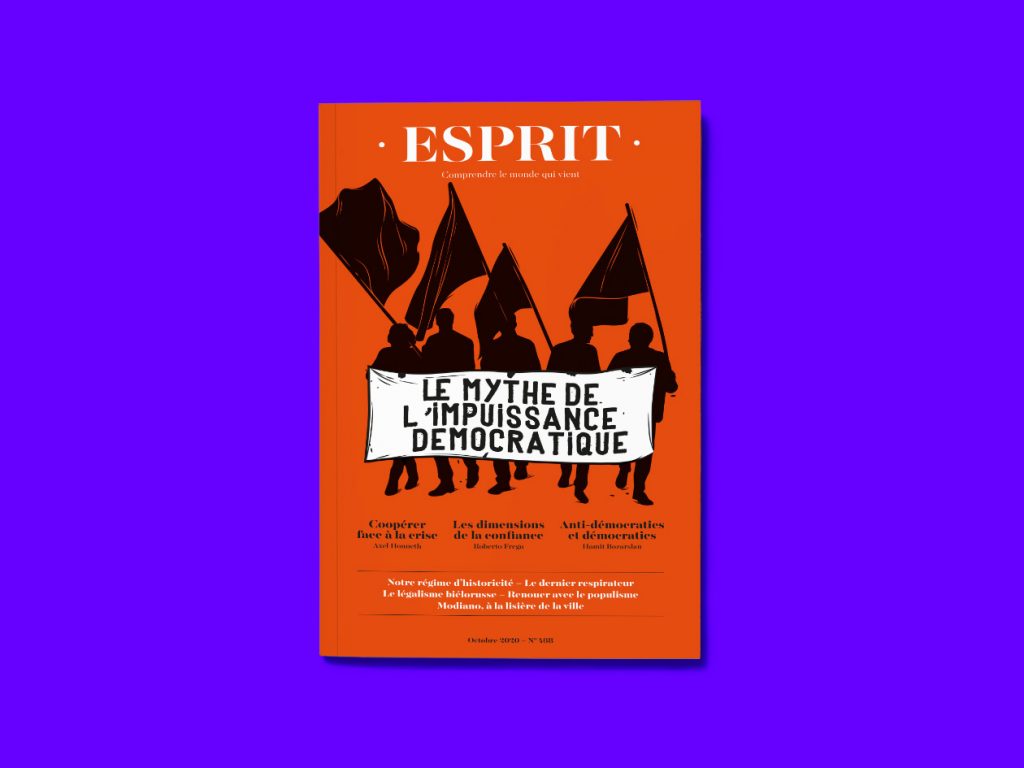Slow, indecisive, vulnerable to manipulation: the charges against democracy are familiar. But as contributions to ‘Esprit’ argue, what makes democracy fragile also makes it strong. Including Michaël Fœssel on democracy’s relation to time, and Axel Honneth on the new spirit of participation.

Democracy and time
The relationship between democracy and time is complex, writes Michaël Fœssel. If time is seen as external to action, it is easy to conclude that vertical decision-making is most efficient. However, collaboration and debate can transform the coordinates of time. For collapsologists, time is not just a commodity but a burden; the phrase ‘race against time’ has been used frequently during the pandemic. But democracy happens when time is negotiated rather than endured.
Instead of a fixed past on which to build a national myth, history can be endlessly reinterpreted; instead of a defeatist vision of decline, the ability to deliberate enables an alternative future to be chosen. Authoritarianism cannot create consensus, so it relies on fear – but fear prevents collective initiative by presenting time as something unchangeable. The indeterminate time of democracy makes it fragile, but not weak.
Democracy and pandemic
Countries that handled the pandemic best tend to fall at either end of the authoritarian–democratic spectrum: China and certain western European countries. Axel Honneth derides the ‘triumphant lamentation of Foucauldian intellectuals’ who see the pandemic as confirmation of the encroachment of state biopower, arguing that the ‘informed majority of the citizens willingly accept small but not catastrophic limitations of civil liberties in order to cooperatively help one other reduce the physical dangers of the virus’.
Honneth acknowledges that ‘the vertical exercise of power has become stronger because of the need for quick and concentrated measures against the crisis’, however is cautiously optimistic that reliance on participation has led to greater social integration, ‘at least in some European countries where citizens had to learn how much they depend on each other’.
In a series of short discussion pieces, Didier Fassin argues that lockdown has demonstrated the principle of biolegitimacy: life takes precedence over everything else, even in prisons. Raphaël Kempf documents increasingly authoritarian tendencies in France since 2001: the pandemic has continued this trend, creating an oxymoronic ‘authoritarian democracy’. Jean-Claude Monod argues that the drift towards oligarchy in many western democracies is not an inherent feature of liberal democracy. Florence Padovani describes daily life in Beijing, where residents are reassured by anti-COVID measures seen as draconian in Europe.
For Nicolas Léger, Italy’s recent success in battling the virus was due to its communal culture, which engendered a strong sense of solidarity and mutual responsibility. Livia Velpry and Pierre A. Vidal-Naquet discuss the democratic aspects of lockdown in terms of how people have adapted to or bent the rules. Nicolas Henckes argues that if health is primarily the capacity to act, the goal should not be to fight the virus but to learn to live with it.
This article is part of the 19/2020 Eurozine review. Click here to subscribe to our weekly newsletter to get updates on reviews and our latest publishing.

This article was published in cooperation with CAIRN International Edition, translated and edited by Cadenza Academic Translations.
Published 21 October 2020
Original in English
First published by Eurozine
Contributed by Esprit © Eurozine
PDF/PRINTPublished in
In collaboration with
Newsletter
Subscribe to know what’s worth thinking about.
Related Articles

Viewing authoritarianism as a political trend overlooks the damage it can cause. The devastation ‘illiberal democracies’ are inflicting on cultural and media sectors show just how difficult it is to recreate something once it has been taken apart. Eurozine partners discuss ways to sustain journalism at the 32nd European Meeting of Cultural Journals.

Back on the Trump track
Topical: US Election
War, women’s rights, deportations and democracy: what’s at risk as Trump returns? Eurozine’s topical reads on what to expect of the power shift in the US.









